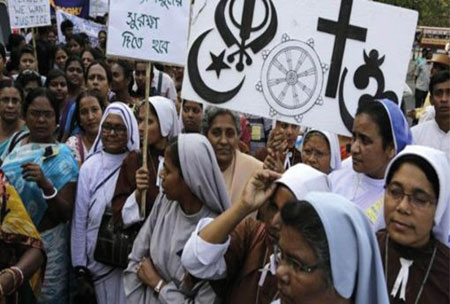The United Nations is set to examine the human rights record of India on November 10 as the human rights organizations, in their reports, have already exposed its ruse of a secular polity with “serious regression” in human rights and constitutional protections under the BJP-led government.
The UN Human Rights Council’s Universal Periodic Review (UPR) Working Group would examine India’s human rights record for the fourth time in its session taking place from November 7-18 which marks the beginning of the UPR fourth cycle.
India’s first, second and third UPR reviews took place in April 2008, May 2012 and May 2017, respectively.
The URP is a unique process involving a review of the human rights records of all UN member states which provides the opportunity for each state to declare what actions they have taken to improve the human rights situations in their countries.
In its report submitted to the UN, the Indian government claimed it to being firmly committed to the promotion and protection of human rights with its constitution guaranteeing civil and political rights, justice, liberty, equality, fraternity and individual dignity within a secular democracy.
However, the joint submissions of reports by around 70 human rights organizations across different countries challenged the Indian official position by highlighting the human rights abuses by India including the escalated crackdown on independent and democratic institutions, and using draconian sedition, counterterrorism, and national security laws to prosecute and harass human rights activists and journalists besides growing attacks, discrimination, and incitement against religious minorities.
Among those who submitted their reports to the UN included, among others, ActionAid Association, Amnesty International, Christian Solidarity Worldwide, Global Partnership to End Violence Against Children, Human Rights Watch, International Campaign to Abolish Nuclear Weapons, International Commission of Jurists, Islamic Human Rights Commission, Kashmir Institute of International Relations and National Campaign Against Torture.
In their statements, the human rights bodies called for the Indian government to enact a national anti-torture law, adopt legislation to criminalize hate speech and prevent communal violence, besides formulating rigorous anti-discrimination law and policies.
They recommended that the Narendra Modi-led government enact a national law to recognise and protect human rights defenders in compliance with the UN declaration on human rights defenders.
In its report, the European Centre for Law and Justice stated that despite its abolishment, the caste system was still very much prevalent, especially in rural areas and states that had anti-conversion laws.
The joint submission by Forum for UPR in Tamil Nadu; People’s Watch, Madurai (India) and Human Rights Defender’s Alert stated that the scheduled castes and scheduled tribes were economically deprived and socially marginalized, and lacked resources, access to education, employment and other income-generating opportunities.
The Kashmir Institute of International Relations stated that Jammu and Kashmir remained a blind side in the universal periodic review as under the Public Safety Act, Unlawful Activities (Prevention) Act and the Armed Forces Special Power Act, Indian armed forces and police were continuously committing grave human rights abuses in Jammu and Kashmir with impunity.
The HRW also stated that Kashmiris were facing repression after the government had revoked the state’s special constitutional status, with many detained.—APP










